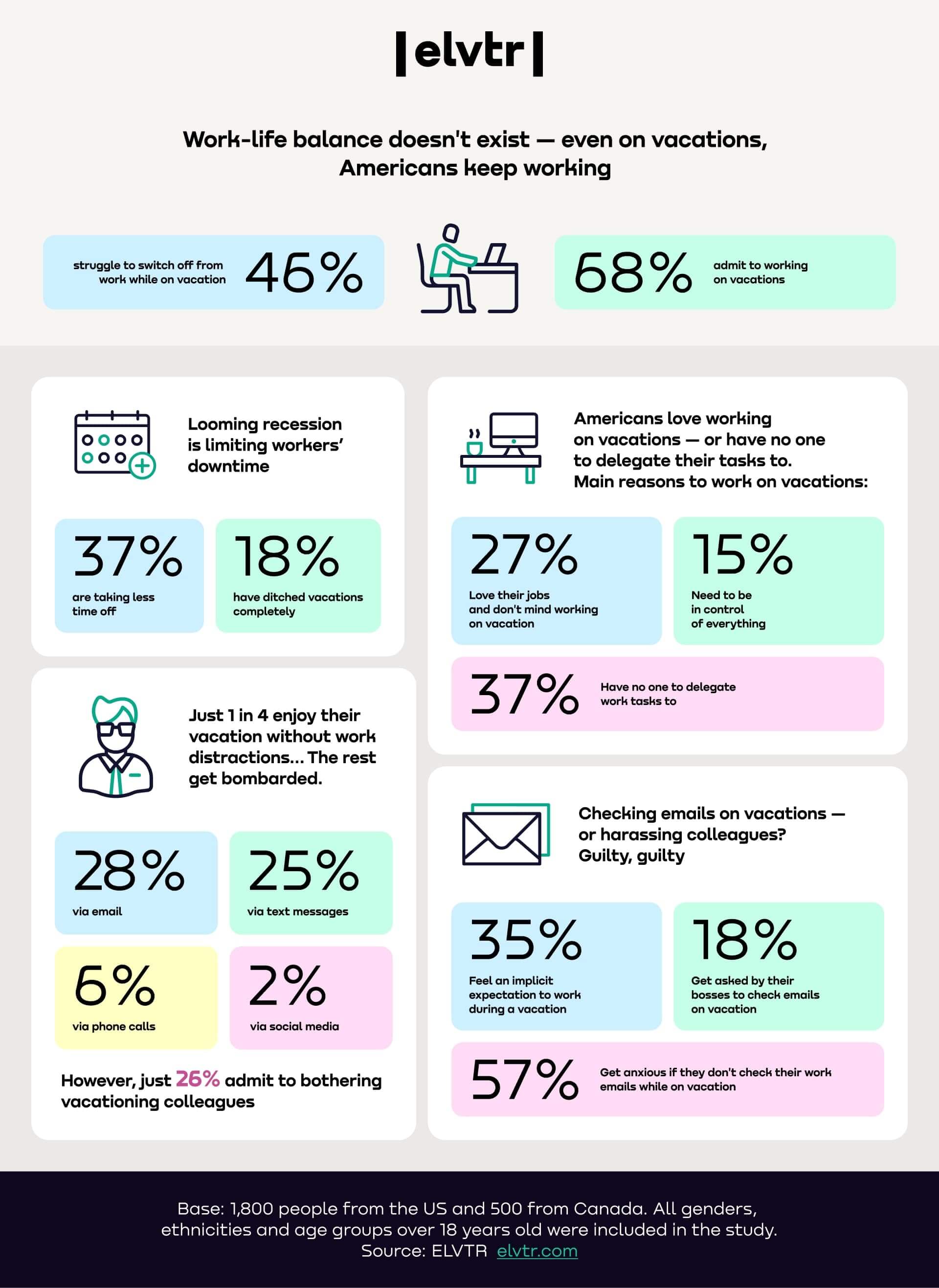
“However, the fact that 28 percent of U.S. workers reported being bothered by emails during their vacation suggests that their engagement with emails goes beyond mere inbox management. It’s likely that they are not just cleaning their inbox but are also responding to and handling work-related matters” while on vacation, he told SHRM Online.

Why Are They Working?
“Nobody wakes up on their day off and thinks ‘I better check my emails’ because they can’t get enough of their job,” Viktor Grekov, business productivity expert and founder of the OKR Software company Oboard, told SHRM Online. “They do so because they fear everything will fall apart if they don’t.”
In fact, 37 percent of respondents to the Elvtr survey said there was no one to delegate their work to during their vacation. Other reasons workers gave for responding to work-related messages during their so-called “down” time:
- Anxiety: 57 percent feel anxious if they don’t check their work emails while away.
- Employer expectations: 35 percent feel an implicit expectation to work, but only 3 percent said they were openly asked to work.
- Control issues: 15 percent said they needed to stay in control of their work/job.
- Fear: 8 percent are afraid of losing their job.
- Mistrust: 3 percent said they were concerned colleagues would take advantage of their absence.
Elvtr’s findings are not so surprising, given a Pew Research survey in February of 5,902 U.S. workers who don’t unplug when the workday is done.
While not drilling down specifically to vacation time, the survey found that in general, 28 percent of workers answer work emails or other messages outside of their normal hours “often or extremely often.” More than one-fourth (27 percent) do so “rarely or never,” and 12 percent said they don’t receive work messages.
Pew found that among respondents with higher incomes, 39 percent were more likely to respond to after-work messages than those with middle or lower incomes (26 percent and 20 percent, respectively).
Members of Generation Z are slightly less likely to respond to work messages than other generations—41 percent versus 46 percent overall, according to Elvtr. Elvtr’s survey found 68 percent of all workers admitted to working during vacations—62 percent some of the time and 6 percent often or always.
However, nearly three-fourths (73 percent) of all workers said they feel guilty about working during their vacation.
Setting an Example
“Sacrificing personal time to maintain job security is a common occurrence during financial crises,” Grekov said in a statement about Elvtr’s findings. “However, this can have devastating consequences for both employees and employers.”
In the short term, workers experience increased stress and health issues and a decrease in productivity if they don’t have a chance to recharge, he noted. Long term, it can lead to turnover and employers get a reputation for disrupting their employees’ personal time.
Businesses should put comprehensive policies and procedures in place, Grekov advised, to make clear they do not condone work encroaching on employees’ time off. His other recommendations:
- Create team policies and strategies that address root causes for working while on vacation.
- Set collective goals that don’t overly rely on any one individual, for example, so that “progress doesn’t come to a standstill whenever a particular worker steps out of the office,” Grekov said.
- Provide tools to help employees work smarter and use their time more effectively.
- Set a good example.
“It may take some getting used to, but it falls on managers to lead by example,” Grekov said. “Take your vacation, make clear who to contact in your absence, set your boundaries before you leave,” such as setting up out-of-office messaging and turning off your phone, “and offer the same respect to your colleagues when they’re away.”
- Offer companywide time off.
“With entire teams away from the office, there’s far less chance of unwanted interruption,” Grekov said.
Some of the responsibility for not unplugging lies with the employee. More than one-fourth (27 percent) of workers told Elvtr that they love their job so much they don’t mind working during vacation. Among reasons individuals do so, Psychology Today reported, is because they over-identify with the company, set high performance standards for themselves, or their self-esteem is wrapped up in their work.
Company- or departmentwide time off could help alleviate a tendency to work during off hours.
“American workers are being pushed to the brink, with many sacrificing their well-deserved vacations and downtime in the name of productivity,” Peskin noted. “It’s high time we hit the ‘pause’ button on this relentless race.”
